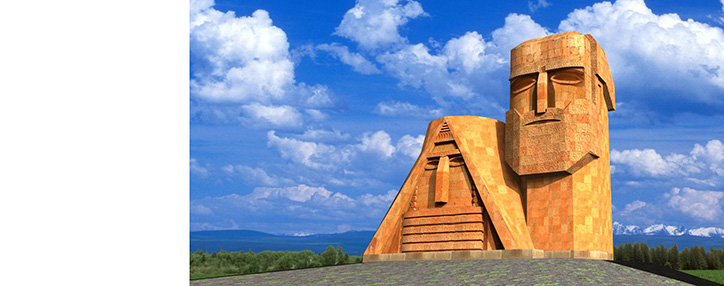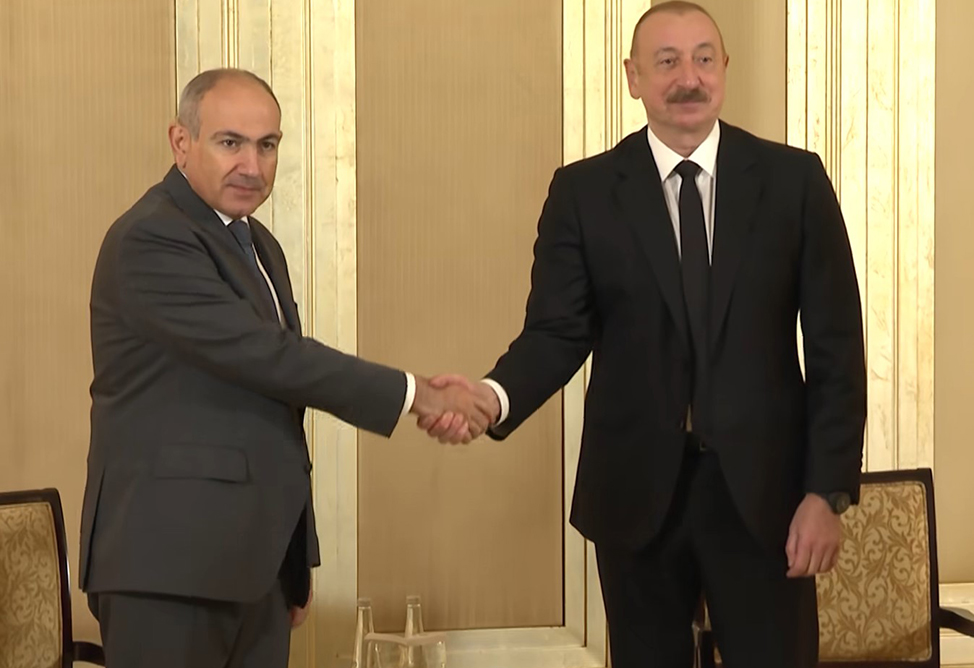Azerbaijan's destructive stance has no impact on Armenian sides and on ongoing democratic processes in Artsakh
21.05.2020,
16:20
Armenia's Ministry of Foreign Affairs slammed today Azerbaijan for its reaction to the inauguration of the newly-elected president of Artsakh Republic (Nagorno-Karabakh) Araik Harutyunyan.

YEREVAN, May 21. /ARKA/. Armenia's Ministry of Foreign Affairs slammed today Azerbaijan for its reaction to the inauguration of the newly-elected president of Artsakh Republic (Nagorno-Karabakh) Araik Harutyunyan.
Anna Naghdalyan, spokeswoman for the ministry, said in a statement: " It’s worth mentioning that the threats of war or military posturing communicated either through statements or large-scale military exercises in violations of international commitments, represent traditional components of Azerbaijan's destructive stance, which has no impact either on the positions of the Armenian sides in the Nagorno-Karabakh issue or on the ongoing democratic processes in Artsakh. Nevertheless, they definitely undermine the establishment of an environment conducive to peace, which is necessary for the consideration of substantive issues. Armenia is committed to an exclusively peaceful settlement of the conflict within the framework of the OSCE Minsk Group Co-Chairmanship.
Once again congratulating the people of Artsakh on the formation of authorities as result of democratic processes, we would like to reiterate that the Republic of Armenia will continue to closely cooperate with the new authorities, which represent the people of Artsakh in the peace process, and in this context we will consistently protect the exercise of the right of the people of Artsakh to self-determination without any limitations.'
Araik Harutyunyan won in the second round of the presidential election held in Artsakh on April 14, garnering 88% of the vote. His rival, self-nominated Masis Mayilyan, won 12%.
The Nagorno-Karabakh conflict erupted into armed clashes after the collapse of the Soviet Union in the early 1990s as the predominantly Armenian-populated enclave of Azerbaijan sought to secede from Azerbaijan and declared its independence backed by a successful referendum.
On May 12, 1994, the Bishkek cease-fire agreement put an end to the military operations. A truce was brokered by Russia in 1994, although no permanent peace agreement has been signed. Since then, Nagorno-Karabakh and several adjacent regions have been under the control of Armenian forces of Karabakh. Nagorno-Karabakh is the longest-running post-Soviet era conflict and has continued to simmer despite the relative peace of the past two decades, with snipers causing tens of deaths a year.
In the early hours of April 2, 2016 Azerbaijan, in gross violation of the agreements launched a large-scale offensive along the entire Line of Contact between the armed forces of the Nagorno-Karabakh Republic and Azerbaijan, using heavy weaponry, artillery and combat aircraft. Only thanks to the decisive actions of the Defense Army, which gave a fitting rebuff, on April 5, Azerbaijan was forced to ask, as in 1994, through the mediation of the Russian Federation for the cessation of the hostilities. It has been generally maintained, despite the recurrent violations by the Azerbaijani side. -0-
Anna Naghdalyan, spokeswoman for the ministry, said in a statement: " It’s worth mentioning that the threats of war or military posturing communicated either through statements or large-scale military exercises in violations of international commitments, represent traditional components of Azerbaijan's destructive stance, which has no impact either on the positions of the Armenian sides in the Nagorno-Karabakh issue or on the ongoing democratic processes in Artsakh. Nevertheless, they definitely undermine the establishment of an environment conducive to peace, which is necessary for the consideration of substantive issues. Armenia is committed to an exclusively peaceful settlement of the conflict within the framework of the OSCE Minsk Group Co-Chairmanship.
Once again congratulating the people of Artsakh on the formation of authorities as result of democratic processes, we would like to reiterate that the Republic of Armenia will continue to closely cooperate with the new authorities, which represent the people of Artsakh in the peace process, and in this context we will consistently protect the exercise of the right of the people of Artsakh to self-determination without any limitations.'
Araik Harutyunyan won in the second round of the presidential election held in Artsakh on April 14, garnering 88% of the vote. His rival, self-nominated Masis Mayilyan, won 12%.
The Nagorno-Karabakh conflict erupted into armed clashes after the collapse of the Soviet Union in the early 1990s as the predominantly Armenian-populated enclave of Azerbaijan sought to secede from Azerbaijan and declared its independence backed by a successful referendum.
On May 12, 1994, the Bishkek cease-fire agreement put an end to the military operations. A truce was brokered by Russia in 1994, although no permanent peace agreement has been signed. Since then, Nagorno-Karabakh and several adjacent regions have been under the control of Armenian forces of Karabakh. Nagorno-Karabakh is the longest-running post-Soviet era conflict and has continued to simmer despite the relative peace of the past two decades, with snipers causing tens of deaths a year.
In the early hours of April 2, 2016 Azerbaijan, in gross violation of the agreements launched a large-scale offensive along the entire Line of Contact between the armed forces of the Nagorno-Karabakh Republic and Azerbaijan, using heavy weaponry, artillery and combat aircraft. Only thanks to the decisive actions of the Defense Army, which gave a fitting rebuff, on April 5, Azerbaijan was forced to ask, as in 1994, through the mediation of the Russian Federation for the cessation of the hostilities. It has been generally maintained, despite the recurrent violations by the Azerbaijani side. -0-



